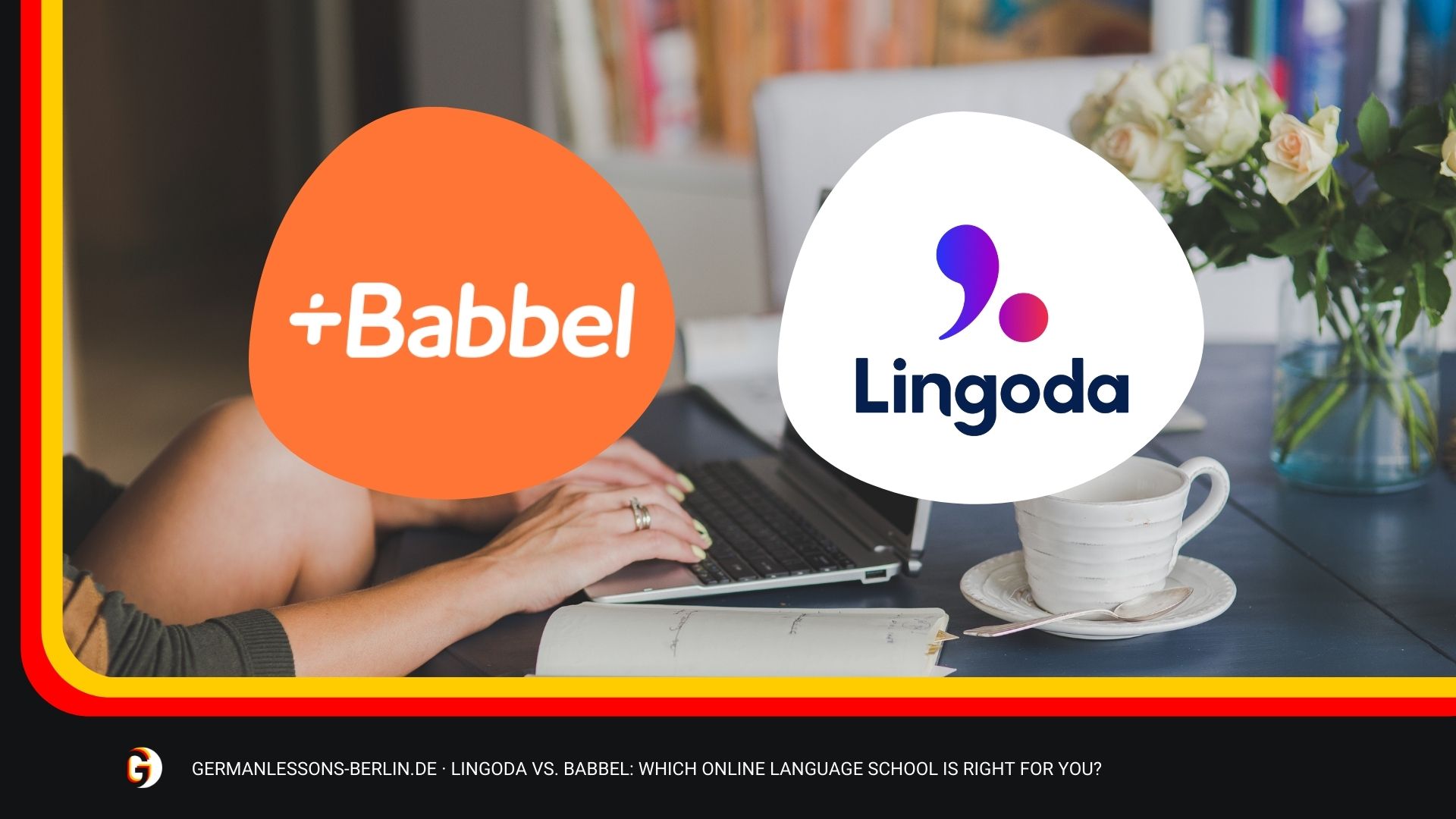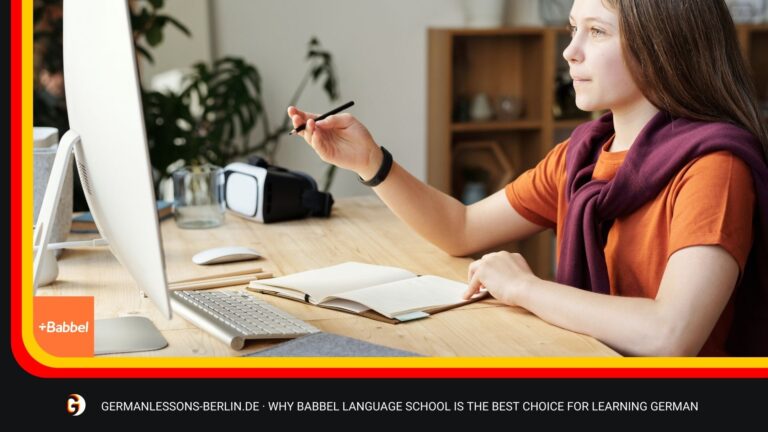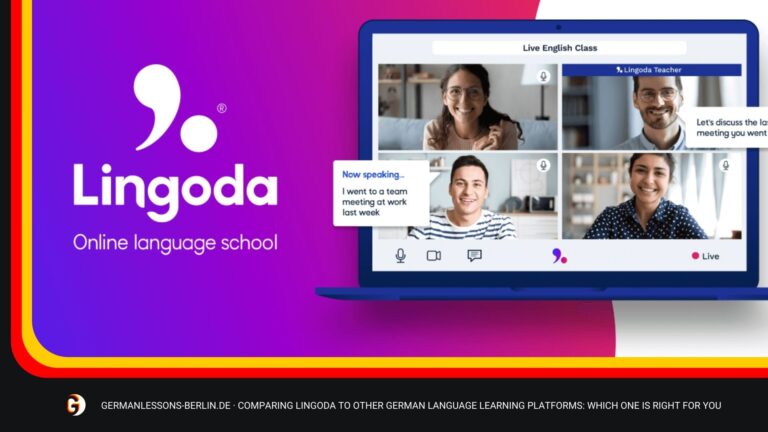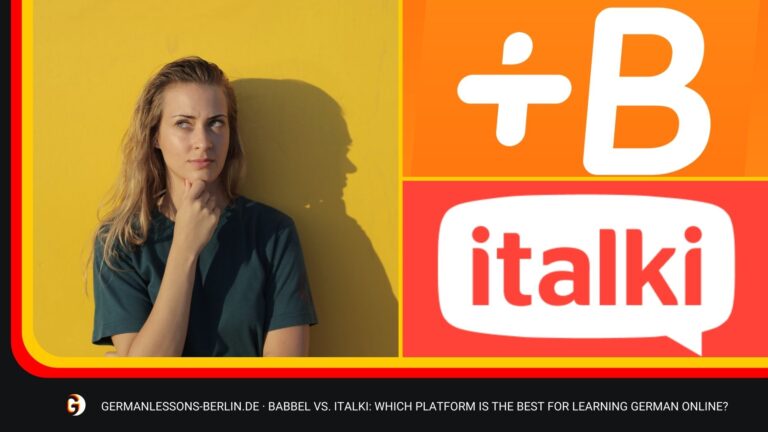Are you looking to learn a new language? Or brush up on your current studies. With so many options, it cannot be easy to decide what type of online school is right for you. Lingoda and Babbel are two popular choices offering unique advantages – but which should you choose? In this article, we will compare both services in terms of quality, affordability, and convenience so that you can make an informed decision.
Learning a foreign language is becoming more critical as the world continues evolving and becoming increasingly interconnected. Whether for business or pleasure, having the ability to communicate with people from different countries and cultures opens a whole new realm of possibilities. However, finding the time and resources to study another language can be challenging – which is why online schools like Lingoda and Babbel have become such invaluable resources.
Both companies offer comprehensive programs designed to help learners reach their goals quickly and efficiently. You’ll get access to live classes taught by experienced professionals from all over the world. Plus, each offers flexible schedules, specialized curriculums, and personalized learning plans – making them perfect for anyone looking for an immersive experience without leaving home! Please keep reading to find out exactly how these two schools stack up against each other regarding cost, content, and results!
Table of Contents
Definition Of Online Language Schools
Online language schools are becoming increasingly popular for those wanting to learn a foreign language. These virtual learning spaces offer an array of online language classes, with the option of one-on-one tutoring and guidance from experienced professionals. Whether you’re looking to brush up on rusty skills or start fresh, there’s something out there that will fit your needs.
Online language learning is more convenient and cost-effective than traditional in-person classes. With options ranging from self-paced courses to live interactive sessions, plenty of resources are available for those who want to take their language education into their own hands. Not to mention all the tools at your disposal – apps, websites, podcasts – these further supplement your ability to master new languages without breaking the bank.
With so many different platforms offering various online language tutoring services, it can take time to know which school is right for you. There are dozens of well-known ones like Lingoda and Babbel vying for attention; however, each has its unique set of features that cater to specific learners’ needs. It’s essential to research what works best for you before making any commitments – whether that means ease of use or affordability – because finding the perfect fit is vital when embarking upon any new educational endeavor.
So how do you decide? Ultimately it comes down to understanding yourself as a learner and asking critical questions regarding motivation levels and personal goals: Are you looking for quick results or willing to put in long hours? Do you prefer group settings or individual focus? Answering these (and other) questions should give you better insight into what type of online language school is most suitable for your situation!
Overview Of Lingoda
Lingoda is a leading online language school that offers in-depth courses and ample resources to help students learn languages quickly. Lingoda’s course offerings are comprehensive, covering all major languages, such as English, German, Spanish, and French. They also offer specialized courses like Business English and Exam Preparation for specific needs. Their focus on efficiency makes them an attractive option for those who want to learn without having to spend extra time or money.
The pricing structures at Lingoda depend on the plan chosen by each student. The most popular options include the following:
- Monthly subscriptions.
- Unlimited access to their lessons and interactive quizzes.
- One-time purchases for individual programs.
All plans come with 24/7 support from experienced coaches who can guide your learning journey.
At Lingoda, you will find a wide range of activities designed to engage beginners and experts alike. From speaking practice sessions with native speakers to advanced grammar classes, there is something here for everyone. Plenty of helpful resources are available in the form of video tutorials and audio files so you can further strengthen your knowledge base while still enjoying yourself.
Overall, Lingoda provides an excellent platform for anyone looking to gain proficiency in a foreign language in an efficient manner. With its flexible plans and high-quality content, it’s easy to see why they have become one of the top choices among aspiring polyglots worldwide!
Overview Of Babbel
Babbel is an online language school that offers courses in more than 20 languages. You can choose from beginner, intermediate, and advanced lessons for all the major languages taught. It’s a great way to learn a new language or brush up on your existing skills, no matter your level.
At Babbel, you can engage with native speakers through their interactive live sessions and use their innovative teaching methods, such as video-based learning, audio recordings, and written materials. The school also provides cultural advice regarding understanding different countries’ cultures and customs – invaluable information if you plan to visit or work abroad!
You can customize your experience by choosing topics of interest, tailoring classes around them, and even picking specific tutors who specialize in those topics. Plus, plenty of other features are available, like virtual tours, game-like exercises, and extra activities to help keep you motivated while learning.
Overall, Babbel is an excellent choice for anyone looking for a comprehensive online language school that focuses on traditional grammar rules and practical application of the language through conversation practices. With its flexible format and engaging content, learners will have fun while gaining valuable knowledge about foreign languages.
Comparison Of Course Offerings
Having looked at Babbel, let’s now compare their course offerings to those of Lingoda. When it comes to online language courses, both schools offer a variety of options for students. Here is what you can expect from each:
- Lingoda: Lingoda offers over 5,000 live classes per month in German, English, French, and Spanish with native-speaking teachers and ten different levels ranging from beginner to advanced. They also have an extensive library of self-study programs that students can access anytime.
- Babbel: Babbel has more than 1,500 lessons available across eight languages – Japanese, Korean, Chinese (Mandarin), Italian, Russian, Arabic (Modern Standard), Portuguese and Dutch – as well as four different course types and nine levels of difficulty.
These two language schools provide learners with plenty of choices when it comes to selecting the best course for them. Some factors you may want to consider when making your decision are the type of learning experience you prefer; whether it’s face-to-face or virtual classes taught by professional instructors or self-paced digital courses on your own time; which language you wish to learn; and where your current level lies so you can choose the appropriate course level for yourself.
When comparing these two language school offerings side by side, some apparent differences between them will help inform your final decision about which one is right for you. For example, if you’re looking for a wide range of choices in terms of languages, then Babbel may be better suited due to its more extensive selection compared to Lingoda’s four main ones. On the other hand, if having access to quality live instruction from experienced teachers is essential, then Lingoda could be a better option given their higher number of monthly classes offered via video conference with real educators.
Babbel & Lingoda are excellent resources when considering taking up a new language. Still, ultimately the perfect fit depends entirely on individual needs and preferences regarding language courses, so carefully weigh all the pros and cons before settling on one!
Comparison Of Pricing Structures
When it comes to pricing structures, Lingoda and Babbel offer different approaches. Lingoda uses a subscription-based format that allows customers to pay monthly or annually for access to the course material. Customers can choose from three packages: beginner, intermediate, and advanced. Prices vary based on the package selected but generally range between $99-$399 per month or $999-$3,899 annually.
Babbel also offers subscriptions with options of one-, three-, six-, and twelve-month terms, as well as discounts for longer-term plans. However, Babbel does not have any pre-defined packages like Lingoda; instead, their prices are calculated according to how many hours you spend studying each week – which is great if you’re looking for more flexibility in your language learning journey. The cost per hour ranges from around $6 -$15, depending on the plan selected.
Both platforms provide multiple payment methods, such as credit cards, PayPal, bank transfers, etc., so customers should be able to find an option that works best for them regardless of where they are located geographically. Additionally, both schools offer free trial periods allowing users to try out courses at no additional cost before committing to paying the total price.
In summary, while Lingoda offers set packages at fixed prices, Babbel provides more flexible pricing tailored to individual needs making it easier for learners to budget accordingly when choosing a language school online.
Comparison Of Teaching Methods
When comparing Lingoda and Babbel, the teaching methods used by each language school are vital in determining which is suitable for you. Both schools offer a variety of teaching styles that cater to different learning types.
Lingoda uses various instructional materials, including videos, audio files, exercises, and classroom activities, to help users learn languages quickly and easily. Each lesson focuses on immersive experiences such as role-playing games, conversations with native speakers, or structured grammar drills. This allows students to practice their language skills in real-world contexts.
Babbel also provides its learners engaging lessons focusing on building fluency through conversation-based instruction. It has incorporated interactive elements into its education, such as virtual classrooms where students can interact with teachers in real time. It has also created unique online tools like chatbots that let learners practice speaking foreign languages from home.
In comparison, both language schools have great teaching methods, but there may be one that works better for your particular needs. Check out their websites and try some free classes to get a feel for what they offer before deciding which one best fits you and your language learning goals.
Comparison Of Learning Resources
The comparison of learning resources between Lingoda and Babbel can be a deciding factor for students choosing the best online language school. Both schools have extensive libraries offering a variety of materials, from instruction books to grammar practice exercises. However, critical differences in terms of their interactive features and instructor support should be considered when making this decision.
| Lingoda | Babbel | |
| Learning Materials | Offers both text-based and audio-visual material with coursework plans tailored by instructors. Includes access to forums, flashcards, and other tools to help reinforce lessons learned. | Primarily video or text-based materials along with information on cultural background-related topics such as history or literature. |
| Practice Activities | Features quizzes, tasks, and games designed to test understanding of new concepts while reinforcing previous lessons. | Tests comprehension through multiple choice questions plus vocab-building activities like matching words and phrases. |
| Language Tools | Interactive pronunciation guides, dictation exercises, and grammar drills for furthering fluency skills. | Grammar tutorials supported by audio recordings plus writing assistance in the form of automated feedback functions within assignments given out by teachers. |
| Instructor Resources | Has an array of experienced tutors who offer real-time guidance via Skype sessions or emails about progress made throughout courses taken at Lingoda. | Provides direct contact with qualified native speakers who specialize in providing personalized advice on how to improve language proficiency quickly. |
Lingoda offers comprehensive packages that include additional benefits such as flexible scheduling options and discounts on tuition fees. At the same time, Babbel provides more one-on-one interaction with instructors, which may benefit those seeking concentrated attention during their studies. It all depends on what type of learner you are; do you want your teacher guiding you every step of the way? Or would you prefer structured classes together with fellow peers? Ultimately it’s up to you!
Comparison Of Student Support Services
Moving on from the resources available for learning, let’s explore the student support services each language school offers. Lingoda and Babbel provide online help in many ways to ensure students have a successful language-learning experience.
Lingoda offers customer service support through email, live chat, and phone – with multilingual staff that can answer questions quickly. They also provide technical support should any issues arise while using their platform. Furthermore, they offer additional language tutoring options to supplement what is taught within their courses.
Babbel provides similar student support services like Lingoda does; however, it focuses more heavily on providing individualized feedback from tutors as part of its course packages or separately purchased sessions. This could benefit those seeking extra guidance when tackling complex material or practicing conversations in a new language.
Although both Lingoda and Babbel offer different levels of student support services, it ultimately comes down to personal preference for which option will work best for you. Eventually, make sure to do your research so that you choose the online school with everything you need to reach your desired level of fluency in the target language!
Pros And Cons Of Each School
Several factors need to be considered when it comes to finding the right online language school. We’ve compiled a list of pros and cons for both Lingoda and Babbel to help you make the best choice.
Lingoda Pros:
- Flexible schedule: You can choose between group classes or one-on-one sessions at your convenience.
- Multilingual teachers: All their instructors are native speakers with experience teaching in various countries around the world.
Lingoda Cons:
- Limited course selection: Currently, they only offer courses in English, German, Spanish, French, and Italian.
- The pricing structure is complicated: Depending on which plan you select, the prices vary significantly from month to month.
Babbel Pros:
- Wide range of languages available: They have over 20 different languages offered through their service, including Japanese, Korean, Dutch, and Portuguese.
- Affordable pricing plans: Prices start at $14 per hour for private lessons or $10 per hour for group classes.
Babbel Cons:
- Not as many options for scheduling sessions compared to Lingoda – all slots must be booked ahead of time, so if you’re looking for more flexibility, this may not be ideal.
- Less experienced teachers than you would find with Lingoda – some students report having difficulty understanding their instructors due to a lack of fluency in English.
When deciding between these two schools, it’s important to consider your individual needs and preferences. Both Lingoda and Babbel offer excellent services, but each has advantages and disadvantages depending on your learner type and how much money you’re willing to invest in learning a new language.
Summary And Recommendations
When it comes to online language schools, the first two that come to mind are Lingoda and Babbel. Both of these language schools offer courses in various languages, using different teaching methods. With so many similarities, choosing which one is right for you can be difficult. Here we will compare both schools based on their pricing structure, course offerings, teaching approaches, and overall value for money.
Lingoda offers a range of payment options with monthly subscription plans ranging from €14-€99 per month, depending on how many units you want to purchase at once. Their courses cover all levels of language proficiency and include topics such as grammar and vocabulary-building exercises. The main advantage here is the flexibility of multiple monthly payment plans.
Babbel’s pricing structure starts at €9 per month, but they also have packages where you can buy more classes upfront at discounted prices. They provide extensive courses covering various aspects of learning a new language, like speaking fluency or achieving academic excellence. In contrast to Lingoda, this school focuses heavily on interactive activities like role-playing games or simulations, which make learning fun and engaging for students of any age group.
Both schools use skilled teachers who understand the importance of customization when it comes to helping each student reach their desired level of proficiency in whichever language they choose to learn from either institution. When compared side by side, both schools offer great value for money due to their low-cost monthly subscriptions and quality instruction delivered through knowledgeable instructors.
Choosing between Lingoda and Babbel boils down to personal preference as they both offer excellent services tailored towards learners looking to improve their foreign language skills without breaking the bank in the process. Ultimately, no matter which online language school you decide upon, rest assured that your investment will pay off in terms of more significant knowledge acquisition over time!
Frequently Asked Questions
How Long Does It Take To Learn A Language With Lingoda Or Babbel?
Learning a language can be daunting, but with the right online school, it doesn’t have to be. One of the most critical questions is how long does it take? When considering Lingoda and Babbel as options for learning a language, several factors affect the duration of the process.
The amount of time needed to learn a language depends on many variables, such as prior knowledge, level of commitment, and the type of course you choose. For instance, if you already know some basics of the target language, your progress may be faster than someone with no experience. Additionally, being able to dedicate more hours each week will speed up your language-learning journey. Finally, courses offered by either Lingoda or Babbel vary from beginner-level classes to advanced levels; this means that depending on which one you pick—and what kind of goals you set—your overall duration also changes.
At Lingoda, they offer different courses and packages tailored to students’ needs; these range from intensive programs lasting four weeks to longer ones that last 12 months or even more. The same applies when studying with Babbel: their flexible plans feature both short-term and long-term opportunities, so learners can decide whether they want an accelerated program or something slower-paced based on their requirements.
When looking into any online school – including Lingoda and Babbel – it’s essential to consider how much time they’ll need to devote to successfully achieving their goals within their desired timeframe. Fortunately, both schools provide resources and support throughout the learning process, so users feel motivated every step of the way!
Are There Any Age Restrictions For Enrolling In An Online Language School?
Are there any age restrictions for enrolling in an online language school? This is a question that many potential students have when considering their options. Whether it’s Lingoda or Babbel, learning a language can be done at any age – from the very young to the more mature.
When looking into taking trial classes through either of these schools, you may notice that they do not explicitly list any specific age requirements. Many systems also require parental consent if you are under 18 years old. That being said, each course has its criteria and rules that must be considered before signing up.
Both Lingoda and Babbel offer flexible programs tailored to each student’s level of experience with the target language and their budget constraints. These courses range from beginner-friendly conversations to highly complex grammar exercises; so no matter your proficiency level, both schools should be able to accommodate your needs.
It’s important to note that while engaging in trial classes on either platform, teachers might ask questions about your current knowledge of the subject material before beginning instruction – this could include anything from basic pronunciation queries to more complicated sentence structure questions. Furthermore, depending on the type of class chosen (group vs. private), varying levels of commitment will be expected by those involved to ensure everyone gets the maximum benefit out of the class time given.
No matter which school you choose, it’s essential that all participants understand what is expected of them during trial classes so they can get the most out of their experience! With fair expectations set beforehand and clear communication between teacher and student(s) throughout the process, anyone can start down the path towards becoming bilingual regardless of their age!
What Type Of Technology Do I Need To Use, Lingoda Or Babbel?
When it comes to enrolling in an online language school, there are specific technical requirements that you must be aware of. Understanding the type of technology needed for each language school is essential to ensure your studies go smoothly and without delay. To help with this, let’s take a look at what type of technology Lingoda and Babbel require.
When considering the technology needs of an online language school, Lingoda is one option worth exploring. To use their platform, all you need is a strong internet connection and either a laptop or tablet device that has access to both audio and video capabilities. This means that as long as your device meets these criteria, you should have no problem accessing their content.
Another popular choice when it comes to online language schools is Babbel. Just like with Lingoda, they also require a good internet connection and audio/video capability on compatible devices such as laptops or tablets. However, unlike Lingoda, Babbel does not offer direct access through mobile phones, so remember this before deciding which platform works best for you.
Whichever language school you choose – whether it’s Lingoda or Babbel – having the right kind of technology available will ensure smooth sailing during your learning journey. So ensure that whatever device you intend to use for your studies meets all the required technical specifications beforehand! That way, once everything is up and running, nothing can stand between you and achieving fluency in your target language.
Does Lingoda Or Babbel Offer Any Free Trial Classes?
If you are considering taking an online language class, one of the essential questions to answer is whether or not a particular school offers free trial classes. Both Lingoda and Babbel offer trial classes that help prospective students get a feel for their teaching style and course material before making any commitment.
Lingoda’s free trial consists of four live group lessons with qualified teachers via video conference. These lessons introduce new students to the learning platform and give them a chance to practice speaking in their chosen language.
Babbel also has a free trial program that provides access to two hours of private tutoring with certified instructors worldwide. During this time, learners can discuss topics relevant to their individual needs and goals while building confidence in their conversational skills.
The benefits of both programs include the following:
– A risk-free way to try out each service without committing right away
– Interacting directly with experienced native speakers
– Accessing quality instruction at no cost
– Exploring different learning styles and methods
– Testing out courses that are tailored by level and topic
Trying out a few free classes can be incredibly helpful when deciding which language school best meets your needs. If you’re looking for personalized support during your journey into fluency, then investing in either option could prove beneficial – especially if you take advantage of their respective trials.
Does Lingoda Or Babbel Offer Any In-Person Language Classes?
Finding the right language school is complex, and knowing if they offer in-person classes is essential. So let’s dive into whether Lingoda or Babbel offer any such options.
When looking at Lingoda, you’ll find that only in-person classes are available through this online language school. Instead, they focus on providing interactive online courses taught by native speakers via live video classrooms.
The situation with Babbel is slightly different – while they don’t have in-person classes either, they provide an option for students who want a more immersive experience. Specifically, they partner with local schools worldwide to arrange study abroad programs where students can take intensive courses in one of more than 40 languages offered by Babbel. Here are some benefits of taking these types of programs:
– It allows learners to immerse themselves entirely in the target culture and practice their new language skills every day;
– The opportunity to make friends from all over the world through shared experiences outside of class;
– You get access to expert tutors and specialized equipment, which could help improve your language abilities faster;
– Students also receive credit for course completion, which can be transferred back home when returning from their trip.
Overall, neither Lingoda nor Babbel offers traditional in-person classes as part of their curriculum offerings. Still, each provides a unique solution for those seeking additional immersion opportunities beyond what’s available online. Whether attending a study abroad program or participating in virtual lessons taught by native speakers – both have something exciting to offer!
Conclusion
In conclusion, when deciding which online language school is right for you, it’s essential to consider the time needed to learn a language with either Lingoda or Babbel. It’s also helpful to know if there are any age restrictions and what type of technology is required to use each platform. Some may want to ensure they can try out a free trial class before making their final decision. Finally, those who prefer more traditional learning methods should check whether Lingoda or Babbel offers in-person courses. Overall, both Lingoda and Babbel have advantages that could help anyone on their journey toward mastering a foreign language. With all these factors in mind, I’m confident that you’ll be able to find the perfect online language school for your needs!








